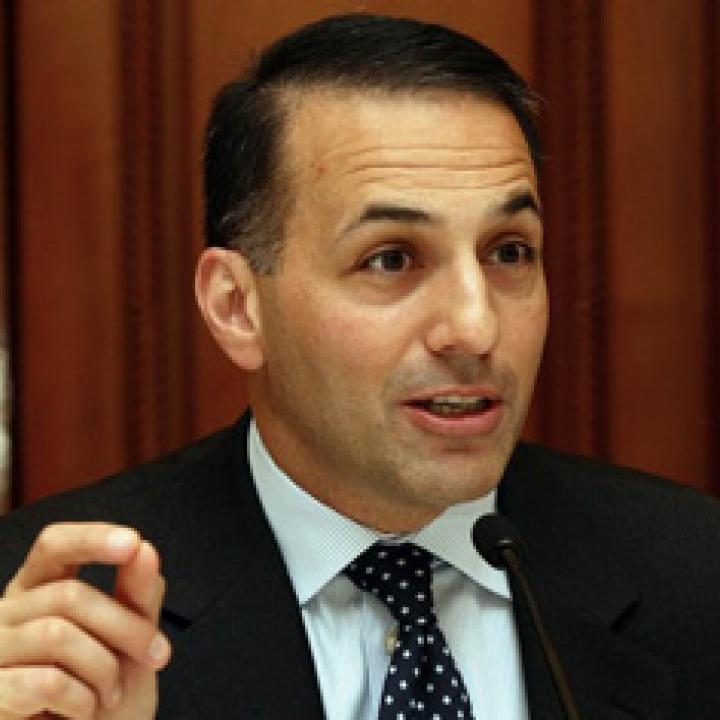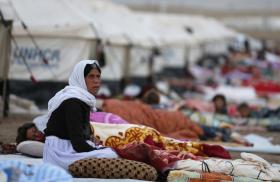
- Policy Analysis
- Counterterrorism Lecture
Confronting the Challenge of Iran: Comprehensive Solutions for a Comprehensive Threat

Part of a series: Counterterrorism Lecture Series
or see Part 1: U.S. Efforts against Terrorism Financing: A View from the Private Sector
How is the Department of Commerce implementing U.S. national strategy to counter Iran's illicit activities and terrorist support?
U.S. undersecretary of commerce Mario Mancuso addressed a Washington Institute Policy Forum on July 22, 2008. The following is the prepared text of his remarks.
For over two decades, the Washington Institute for Near East Policy has been a leader in thinking about -- and advancing -- an American engagement in the Middle East that strengthens our alliances, nurtures our friendships, and promotes security, peace, prosperity, and democracy for all people of the region. It's truly an honor to be standing here at this podium today. Thank you for inviting me to be with all of you.
As undersecretary, I have the great privilege to lead the Bureau of Industry and Security (BIS). As a national security bureau within an economic department, our most solemn obligation is to use our authorities to protect the security of the United States. And one of our most important missions is to administer our nation's dual-use export control system.
Dual-use items are commercial items which also have military applications. A good example of such an item would be this triggered spark gap, which looks like, but is a bit larger than, a simple thread spool. For those of you who may not know, a triggered spark gap has two principal uses. First, it's used widely in medical devices that help destroy kidney stones. It's also used to detonate nuclear weapons.
In an era of global proliferation and national security challenges that defy one-dimensional policy responses (as in the vexing case of Iran), the bureau plays a vital role.
Iran: A Comprehensive Threat
In just a relatively brief period of time, the Iranian regime has managed to achieve quite a remarkable feat: it has united the world against its policies, and now counts all of -- and only-- the world's most dysfunctional regimes as its friends.
This striking achievement, however, should not diminish our view of the Iranian challenge, particularly since Iran has a long history of making the most out of a losing hand.
While Iran is not ten feet tall -- much less ascendant -- it nonetheless represents a challenge that is as comprehensive as it is grave.
Tehran's reckless pursuit of weapons of mass destruction and their means of delivery has raised alarms in capitals around the world. At this late date, Iran continues to develop its fissile material production programs and ballistic missile capabilities. And its continued refusal to suspend its uranium enrichment activities raises serious questions about the true purpose of its program.
At the same time, the Iranian regime still remains both the world's foremost state sponsor of terror and a fastidious interloper in the affairs of other states. While Iran's inward proliferation activities are deeply disturbing, there remains the broader concern that Iran itself will become a primary source for outward proliferation. This is not mere conjecture-- Iran is already one of the primary suppliers of conventional weapons in the region, including to known-terrorist groups.
As if that were not enough, Iran's leaders have -- against all international norms and the plain language of the UN charter itself-- repeatedly called for the destruction of Israel, including by using political and racial arguments that are reminiscent of the darkest hours in human history.
The U.S. Approach in Perspective
To effectively address this urgent challenge, our nation's response must be strategically sound, tactically flexible and comprehensive in nature -- and it must be firm.
As Secretary Rice has made clear, Iran's leaders must know that they must choose a path: one path leads to increased isolation, and heightened hardship; the other path leads to greater cooperation with the international community, and real benefits for Iran.
Today, the U.S. approach includes energetic diplomacy, targeted financial, export control, and other economic measures, and a vigorous counter-proliferation posture. And, of course, as a last, reluctant resort, the military option still remains on the table.
In this broad effort, the bureau's role is deny the Iranian regime access to dual-use goods that would support their nuclear program, harm U.S. and coalition forces in Iraq, or otherwise undermine our security interests in the region.
How BIS Is Responding
Specifically, we're refining and strengthening our export controls, engaging our private sector stakeholders, prioritizing our enforcement efforts, and working with our foreign counterparts to most effectively address the Iranian challenge.
First, we are refining the list of items that we control to ensure that we are focused on sensitive items. Because very little can be traded today with Iran, this initiative operates indirectly, but powerfully, by focusing attention and resources to our global non-proliferation efforts.
Second, to enhance the export control system's overall effectiveness, we are providing more information to our private sector stakeholders -- our front-line partners in the enforcement of our regulations-- about customers around the world that raise concerns for us.
Currently, we maintain three separate lists: the Denied Parties List, the Unverified List, and the Entity List. The Denied Parties List is a list of individuals and entities that have been denied export privileges. The Unverified List is a list of parties where BIS has been unable to verify end use in the past. The Entity List is a list of parties whose participation in a given transaction triggers license requirements. All of these lists are available on our website, www.bis.doc.gov.
Third, we are sharpening our enforcement efforts to focus on those areas of greatest concern to us: proliferators, terrorists, and nations of illicit transshipment concern. Every day, our BIS special agents work closely with other federal law enforcement agencies, including the Department of Justice (DOJ), the FBI, and the Department of Homeland Security, to conduct investigations and punish violations of our export control regulations. Our agents also work with our colleagues in the national security and intelligence community to provide expert analytic support to broader national security efforts.
This past May, with critical BIS support, DOJ successfully prosecuted two separate cases of a U.S. exporter attempting to ship radiographic and computer equipment to Iran. In another recent case, BIS special agents provided crucial support to indict two munitions dealers for conspiring to transfer military aircraft parts to Iran. Some of the particular charges in this latter case carry up to a twenty-year prison sentence, and fines of up to $1 million.
When foreign companies take controlled U.S. technology and illegally transfer it, they also face serious repercussions. In the past few weeks alone, we have issued several Temporary Denial Orders suspending the export privileges of multiple non-U.S. companies and individuals for knowingly re-exporting U.S. origin aircraft to Iran. These are just a few of the Iran-related cases our team is actively working on. There have been others in the past, and we suspect that there will be significant other cases in the future.
Finally, we are also working with our partners and allies around the world to enhance their system of export controls in order to eliminate gaps in the system and to maximize the effective impact of our efforts.
We are especially concerned about the issue of illicit trans-shipment, where third-country ports around the world are used by private parties to help illegally transfer U.S. controlled goods to other parties, including, in some cases, to individuals and entities in Iran.
Just three weeks ago, I returned from the Middle East, where I had the opportunity to discuss this important issue with senior public and private sector officials in the United Arab Emirates (UAE), a valued U.S. partner. Over the past year, the UAE and the United States have worked closely together to address this issue, and we have made real progress. In particular, the UAE has taken several important steps, including the adoption of an export control law last summer, and increased on-the-ground cooperation with various U.S. agencies, to help identify and interdict illicit transhipments. While more work remains to be done, we commend the UAE's real progress thus far, and we remain fully committed to continuing our support of their efforts.
But there is more work we can do to be more effective, and to persuade other nations to adopt responsible export control laws. To begin with, we must reauthorize our own permanent dual-use export control law, the Export Administration Act (EAA), which has been in lapse since 2001.
Currently, BIS must exercise its regulatory and enforcement authorities through temporary, emergency powers granted to us by the president under the International Emergency Economic Powers Act.
The temporary authorities we now have are useful, but they do not eliminate the need for the full set of tools a new EAA would provide. As technology know-how, supply chains, and markets become more global, effectively denying the sale of sensitive U.S. technologies to those who would harm us has become more difficult -- and urgent. Foreign locations now increasingly serve as the venue of commercial activities that pose a threat to U.S. national security, and we need to enhance our law enforcement capabilities to investigate, uncover, and stop these activities wherever they may occur.
While BIS special agents have done a tremendous job to date, they need updated tools to combat proliferation in an era of globalization.
Today, our agents are unable to work directly with their foreign law enforcement counterparts. In fact, they do not even have the legal authority to conduct undercover operations -- or even make a simple arrest -- in the United States without undergoing a cumbersome bureaucratic process. While effective cooperation between U.S. law enforcement agencies has enabled our agents to overcome some of these hurdles, a new EAA would strengthen the system and enhance our security by enabling domestic and international investigations and enforcement actions to proceed more quickly, efficiently, and effectively.
But renewing the EAA would also have another important benefit: it will bolster our diplomatic efforts around the world to encourage other countries to adopt their own export control laws. It is more difficult to make a credible and persuasive case to other nations to enact effective export controls when our own country does not have a permanent dual-use export control law on the books.
I want to take this opportunity to publicly applaud Senator Dodd's efforts to jumpstart the process by introducing legislation to reauthorize the EAA. The administration strongly supports this legislation, and I urge Congress to move quickly to pass it.
Conclusion
As President Bush remarked before the Israeli Knesset earlier this year, "For the sake of peace, the world must not allow Iran to have a nuclear weapon."
The United States remains committed to seeking a peaceful and diplomatic solution to the comprehensive threat posed by Iran, including by administering a vigorous and effective export control regime.
Our sincere hope is that our combined efforts -- along with those of our partners--will persuade Iran to pursue a new course. There is a path, just as Libya has found, for Iran to improve its relations with the international community, including the United States. But that path must represent a real change in behavior on the part of Iran - one that rejects deception, lying, and terror - and instead embraces accountability, rule of law, and respect for the sovereignty of its neighbors.
It is our urgent work to facilitate, in a timely fashion, a responsible decision by Iran. Let us all hope they make the right choice.





